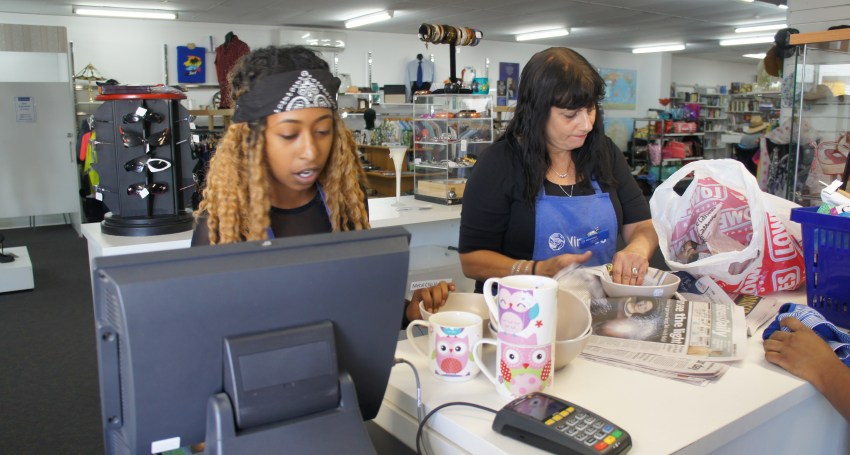Catholic organisations prepare for increased demand after Holden
Local
Catholic-based community organisations in the northern suburbs are bracing for a spike in demand for their services in the wake of the closure of Holden’s Elizabeth plant today.

As the last car rolls off the production line signalling the end to 1000 jobs at the factory, the St Vincent de Paul Society and Centacare have plans in place to ensure they can meet the anticipated growing community need.
“The northern suburbs of Adelaide are already a high need region with many people struggling to put food on the table,” said Vinnies SA CEO David Wark.
“When Holden closes its doors, resulting in more people out of work and intensifying flow-on effects among local supplier and service providers, there is no doubt we will need to rise to the challenge of extra demands on our services.”
Advertisement
Already requests for financial, clothing and food assistance have risen, with Vinnies’ Elizabeth Centre reporting a 50 per cent increase in appointments from 2016 to 2017 and ever-increasing telephone enquiries for assistance.
To cope with this extra demand, the Elizabeth centre was expanded last year and now includes interviewing offices, a Vinnies shop and Fred’s Van.
The Elizabeth and Salisbury Fred Van’s services have seen an “enormous increase” in the number of meals served over the past 12 months – from 30,000 to 40,000 a year. Customers, including many families with children, are now served indoors, providing them with “comfortable and dignified dining”.
The Elizabeth Fred’s Van will commence a new service from early next year, which will provide a nutritious hot meal on the weekend, in addition to the Wednesday evening meal currently provided.
Increasing demand in the northern suburbs has also prompted the establishment of other services, including a Vinnies Community Response Team which provides counselling and assistance, and the pending expansion of a youth program to offer after school homework/mentoring for students.
“Vinnies stands with the workers of Holden, those already retrenched and the thousands of people employed by Holden’s suppliers or service providers all over Adelaide, who face uncertain futures,” Mr Wark said.
Centacare Catholic Family Services’ offices at Salisbury and Elizabeth are also expecting an increase in demand for services when the Holden factory closes.
Manager of Northern Family Support Programs, Judy Delahunty, said that while many of their clients were long-term unemployed, those losing their jobs at Holden and associated suppliers would be facing challenging times in the months ahead.
She said losing work often led to financial hardship and this could put pressure on a person’s relationships, having a significant impact on children involved. People would sometimes turn to drugs, alcohol or gambling as a way to cope during such an upheaval in their life.
“It’s important to recognise that some of these people are suffering from depression, stress and anxiety and if they are unable to get another job, this also impacts their self-esteem,” Ms Delahunty said.
Advertisement
She added that in some cases the Holden closure would impact multiple generations of the same family, which meant they would not be in a position to help each other financially if they were having difficulty paying their rent or escalating costs such as electricity.
“I can only imagine that for some families with a history of working with Holden a family’s very foundations will feel as if they have shifted.
“Unfortunately many people feel a sense of shame in accessing food and other financial support but it’s a fine line for many of us between needing, and not needing, supports at some time.”
Meanwhile, St Patrick’s Technical College is providing alternative career pathways for students in the northern suburbs.
Working closely with Adelaide-based defence industry heavyweights Century Engineering, PMB Defence and Saab Australia through the Federal Government’s $5.1 million P-TECH program, the high school has developed projects to ensure students learn real-world skills sought after by employers.
As local, traditional manufacturing gives way to global economics and technological advancement, workers need to pivot their skills to ensure they are both “employable and meeting the demands on industry”, StPatsTech business development manager Patrick Kelly said this week.
He said the closure of Holden’s Elizabeth plant was a “sad day” for the community and the company had employed some of the school’s students as apprentices. However, he said there was hope and it was now “vitally important” for emerging industries to train today’s teenagers to ensure multi-billion dollar projects earmarked for the region could source the skilled workers needed.
“Often seen as the poor cousin to university education, we are delighted to see universities, government and business recognise the capacity and importance of vocational education and training.”
P-TECH’s focus on science, technology, engineering and maths (STEM) subjects would put students at the forefront of 21st century careers, Mr Kelly added. From 2018, Year 11 students can study both their senior school certificate and a Certificate IV in programming at StPatsTech. This IT stream has been developed in partnership with Saab Australia and aims to produce the next generation of software engineers who have hands-on knowledge to bring engineering designers’ ideas to life.








Comments
Show comments Hide comments